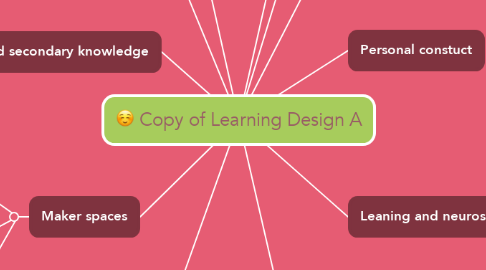Copy of Learning Design A
by Awelani Netshivhulana


1. Constructivism
1.1. Cognitive constructivism
1.1.1. Peer learning
1.1.1.1. Project based learning
1.2. Social constructivism
1.2.1. anchored instruction
1.2.1.1. Games
1.3. Radical constructivism
1.3.1. Reality
1.3.1.1. Objectivity
1.4. Maker spaces
2. Bloom's taxonomy
2.1. Evaluation
2.2. Synthesis
2.3. Analysis
2.4. Application
2.5. Comprehension
2.6. Knowledge
3. Behaviorism
3.1. Punishment of negative behavior
3.2. Reinforcement of positive behavior
3.2.1. Reading
3.2.1.1. Final quiz
3.3. How can we learn with technologies
3.3.1. Providing digital tools
3.3.2. Using personalized learning
3.4. What is learning design
3.4.1. Instructional designer
3.4.2. Exploration
3.4.3. Enhancement
4. Maker spaces
4.1. Help students focus
4.2. Teaches basic problem solving
4.3. Encourage Rethinking the concept
5. Biological primary and secondary knowledge
5.1. Measures of cognitive load
5.2. Biological mechanism
6. Learning Styles
6.1. Collaborative learning
6.2. Active learning
6.3. Authentic learning
6.4. 21 century learning
6.4.1. Creativity
6.4.2. Critical thinking
6.4.3. Communication
6.4.3.1. Collaboration
6.5. Multimedia learning
6.5.1. Gaming and gamification
6.5.2. Multiple media formats
6.5.2.1. Video based learning
6.5.2.2. Podcast
6.5.2.3. Slideshow
6.6. Auditory learner
6.6.1. Visual learner
6.6.1.1. Kinesthetic learner
6.6.1.2. Read
6.6.1.2.1. Spatial
6.6.2. Musical
